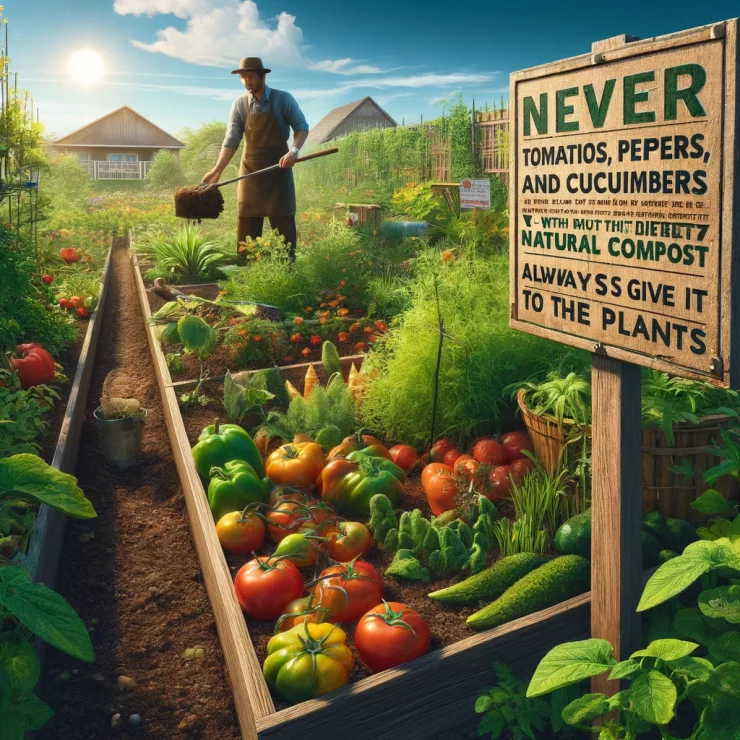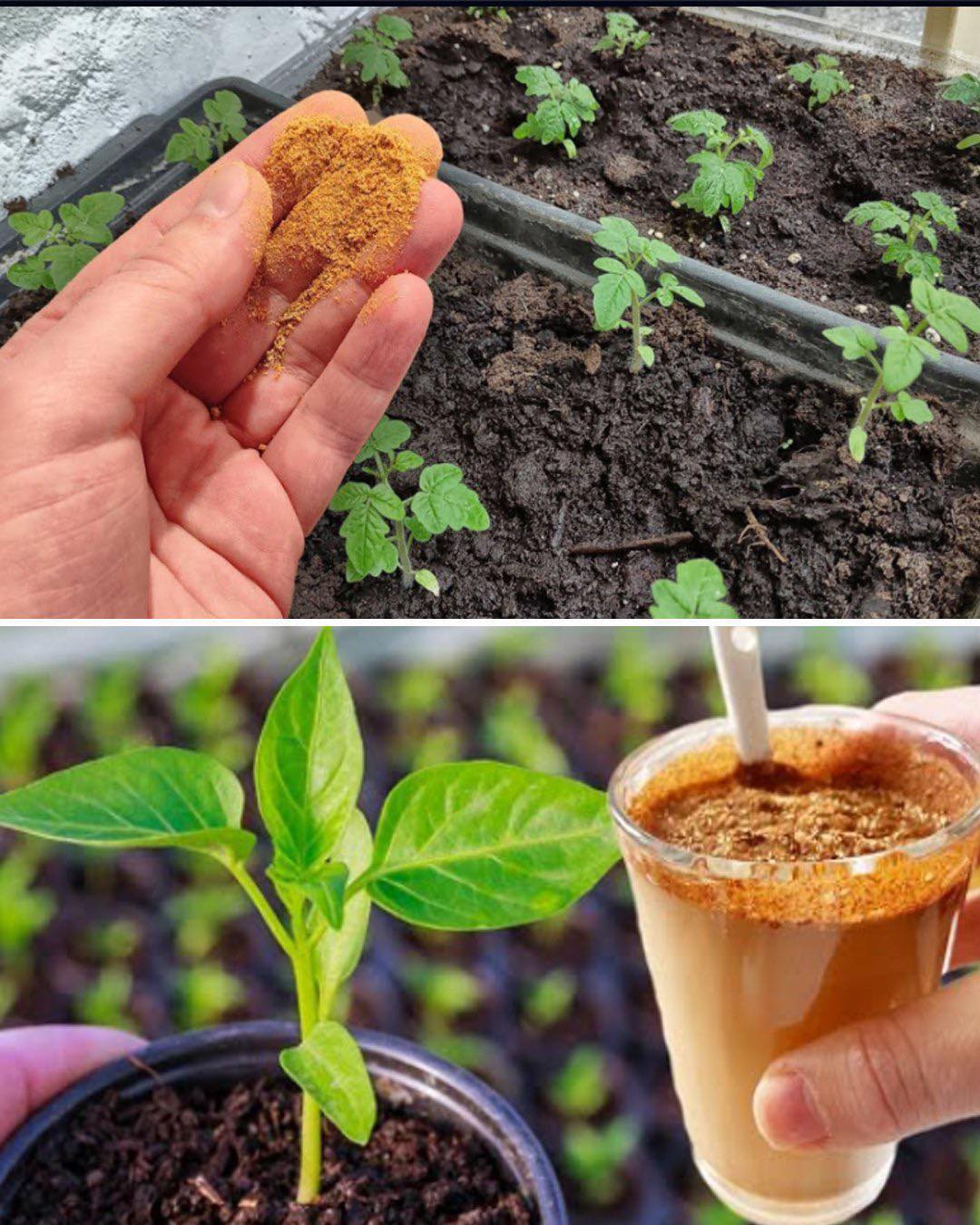In the realm of gardening, the secret to success often lies beneath the surface—in the soil. Tomatoes, peppers, and cucumbers, beloved staples of many gardens, thrive in nutrient-rich soil that supports healthy growth and abundant harvests. While there are many ways to nourish the soil, one method stands out as essential: natural compost. In this article, we’ll discuss why compost is crucial for growing thriving tomato, pepper, and cucumber plants, and we’ll provide you with a simple recipe to create your own nutrient-rich compost at home.

Compost is often referred to as “gardener’s gold” for its ability to enrich the soil and promote plant health. Made from decomposed organic matter such as kitchen scraps, yard waste, and plant debris, compost is rich in essential nutrients, beneficial microorganisms, and humus—a stable form of organic matter. When added to the soil, compost improves its structure, fertility, and water-holding capacity, creating an optimal environment for plant growth.
Why Tomatoes, Peppers, and Cucumbers Need Compost
Nutrient-Rich Soil: Tomatoes, peppers, and cucumbers are heavy feeders that require a diverse range of nutrients to thrive. Compost provides a balanced supply of essential nutrients, including nitrogen, phosphorus, potassium, calcium, and micronutrients, ensuring that plants have access to everything they need for healthy growth and fruit production.
Soil Structure and Drainage: Compost helps improve soil structure by increasing its ability to retain moisture while also enhancing drainage and aeration. This creates a favorable environment for root development, allowing plants to access water and nutrients more efficiently.
Beneficial Microorganisms: Compost is teeming with beneficial bacteria, fungi, and other microorganisms that play crucial roles in breaking down organic matter, releasing nutrients, and suppressing harmful pathogens. By fostering a thriving microbial community, compost promotes soil health and plant resilience.

Weed Suppression: A layer of compost applied to the soil surface acts as a natural mulch, helping to suppress weed growth by blocking sunlight and smothering weed seeds. This reduces competition for water and nutrients, allowing tomato, pepper, and cucumber plants to thrive.
Recipe for Homemade Compost:
Creating your own compost is easy and rewarding. Follow this simple recipe to make nutrient-rich compost at home:
Ingredients:
Kitchen scraps (fruit and vegetable peels, coffee grounds, eggshells)
Yard waste (grass clippings, leaves, small twigs)
Plant debris (spent flowers, trimmings from tomato, pepper, and cucumber plants)
Instructions:
Begin by layering kitchen scraps, yard waste, and plant debris in a compost bin or pile. Aim for a mix of green (nitrogen-rich) and brown (carbon-rich) materials to achieve a balanced compost pile.
Add water to the pile as needed to keep it moist, but not waterlogged.
Turn the compost pile regularly to aerate it and speed up the decomposition process.
Over time, the organic materials will break down into dark, crumbly compost that smells earthy and sweet.
Once the compost is fully decomposed, it’s ready to use in your garden.
In the world of gardening, compost is a gardener’s best friend, and when it comes to growing tomatoes, peppers, and cucumbers, it’s an absolute necessity. By enriching the soil with essential nutrients, improving soil structure, fostering microbial activity, and suppressing weeds, compost sets the stage for healthy, productive plants and bountiful harvests. So, the next time you prepare to plant tomatoes, peppers, or cucumbers, never forget to give them the gift of natural compost—it’s the key to a thriving garden.
News
JJ Redick reacts to Luka Doncic trade for Anthony Davis
In one of the most jaw-dropping moves of the season, the NBA landscape was rocked by the blockbuster trade involving Luka Dončić and Anthony Davis—a swap that has sent ripples of excitement, disbelief, and heated discussion through the league. Among…
Anthony Davis FULL reaction to trade to Mavericks for Luka Doncic
In a blockbuster move that sent shockwaves through the NBA and left fans reeling, Anthony Davis has been traded to the Dallas Mavericks in exchange for Luka Dončić. In the immediate aftermath of the news, Davis took to the media…
Shaq reacts to Dallas Mavericks wanting Kevin Durant after Luka-AD trade 
In the constantly shifting world of the NBA, trade rumors and blockbuster moves are a regular part of the season’s drama. The latest twist has fans buzzing: the Dallas Mavericks have reportedly set their sights on acquiring Kevin Durant in…
Donovan Mitchell FILTHY poster dunk on Kristaps Porzingis 
In a game filled with high-intensity moments and jaw-dropping highlights, one play in particular has left fans and analysts buzzing about Donovan Mitchell’s latest display of athleticism. Early in the contest, with the atmosphere already charged by an evenly matched…
Joel Embiid hits go-ahead bucket vs Mavs then chats with Anthony Davis after game
In one of the most thrilling contests of the season, Joel Embiid delivered a clutch performance against the Dallas Mavericks, punctuating the game with a go-ahead bucket that sent the home crowd into a frenzy. The atmosphere in the arena…
D’Angelo Russell game winner as Nets hit two 3’s in 3 seconds to win vs Rockets 
In one of the most electrifying moments in recent NBA history, D’Angelo Russell delivered an unforgettable game-winner that left fans and commentators in complete awe. With the Brooklyn Nets locked in a tense battle against the Houston Rockets, the outcome…
End of content
No more pages to load











